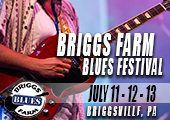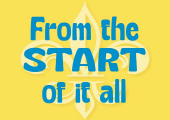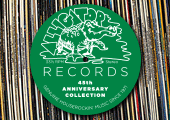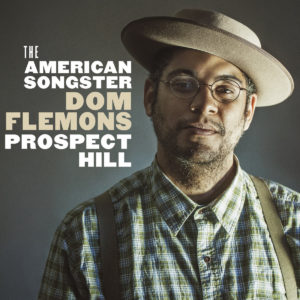 DOM FLEMONS
DOM FLEMONS
Prospect Hill: The American Songster Omnibus
Omnivore Records – OVCD-354
Dom Flemons’ Prospect Hill: The American Songster Omnibus is an ambitious undertaking to redefine the “songster,” a term used to describe musical artists who “sang and played a variety of material in the years before the First World War.” Flemons cites artists such as Papa Charlie Jackson, Robert Wilkins, Richard “Rabbit” Brown, Charley Patton, Bessie Smith, Ma Rainey, Jimmy Rogers, and W.C. Handy as examples of songsters from the early decades of the 20th century. With the emergence of the recording industry, musicians were slotted into specific genres for marketing purposes, and their repertoires often were tailored to conform to the expectations of the genre in which they had been categorized. The recordings of this two-disc set mash up a remarkable range of American roots music—from fife and drum to country blues, country and western to bebop, string band to R&B, traditional jazz to bluegrass, Chicago blues to hip-hop—that have been “refashioned . . . to highlight the definition” of the songster “in a modern context.” For these sessions, Flemons plays an array of instruments, including banjo, guitar, bass drum, quills, harmonica, cane fife, and bones. Since leaving the Carolina Chocolate Drops, he largely works as a solo performer, but to realize this recasting of the songster tradition, Flemons recruited some stunningly versatile help, with one band comprised of Guy Davis on guitar, banjo, mandolin, harmonica, and snare drum; Ben Hunter on fiddle and bass drum, plus background singers Joe Seamons, Pura Fe Crescioni, and Jason Richmond. A second band is comprised of Keith Ganz on guitar and banjo, Ron Brendle on bass, Kobie Watkins on drums, and Brian Horton on saxophone and clarinet. Flemons mixes and matches musicians in the same way he combines genres.
The Omnibus is comprised of three parts, including two previously released recordings: disc one features Part One, the Prospect Hill album (2014); disc two features Part Two, What Got Over (2015), a sequel released as a Record Store Day EP, and Part Three, The Drum Major Instinct, previously unreleased tracks concentrating on rhythms and beats. The 35 tracks that range over the two discs present a coherent soundscape that at once sounds both antique and new. The third disc really lays bare the foundation for all this mixing and matching as Flemons and company expose how hand-made, age-old beats can morph into hip-hop grooves. A kind of post-modern roots extravaganza, some of the standouts include: the swinging neo-New Orleans jazz of ’Til the Seas Run Dry; the seductive Georgia Drumbeat, which melds fife and drum grooves to Chicago blues and bebop improvisation; Marching Up Prospect Hill, a Sonny Terry salute with Davis on harp and Flemons on bones; both versions of the hypnotic propulsion of the fife and drum with handclaps groove on Going Backward Up the Mountain; the rollicking boogie of Flemons’ double-tracked banjo and gritty electric guitar on The Grand Manifesto; and the flowing lyricism of an instrumental duet with Flemons’ acoustic guitar and Ganz’s nylon-string guitar. With Prospect Hill: The American Songster Omnibus, Dom Flemons proves that by digging deep into America’s musical past, new horizons can be opened up.
—Robert H. Cataliotti
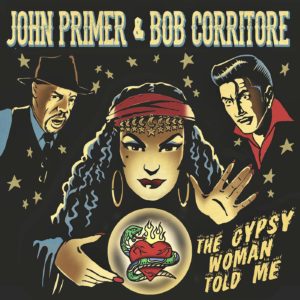 JOHN PRIMER & BOB CORRITORE
JOHN PRIMER & BOB CORRITORE
The Gypsy Woman Told Me
SWMAF Records – SWMAF 14
Certain cities have a well-deserved reputation for their blues. The Midwestern metropolises of St. Louis, Memphis, and Chicago, among others, have rich blues traditions. And the sounds coming out of those cities often bear the stamp of their origin. San Jose, California, might not be one of the first cities that comes to mind when thinking of others, but thanks in large part to producer-musician Kid Andersen, that’s changing. His Greaseland Studio has been and continues to be an effective tool for capturing the raw and rowdy sounds of the blues for 21st-century listeners. And Andersen’s a busy guy. One of his latest production assignments is The Gypsy Woman Told Me, a blues album by John Primer and Bob Corritore.
Chicago blues guitarist John Primer has performed and recorded with Magic Slim, Little Milton, James Cotton, Pinetop Perkins, Hubert Sumlin, Big Mama Thornton, and many others. He was part of the ensemble that created the Grammy-nominated Muddy Waters 100 tribute album in 2015. If those sessions were all he had done, he would still rate as an important figure in electric blues. But starting with 1993’s Blues Behind Closed Doors, he’s made a string of fine Chicago blues albums under his own name. His 1995 album The Real Deal won him a W.C. Handy Blues Award, and his music has been included in many compilations.
Born and raised in Chicago and now (since 1981) living in Arizona, Bob Corritore is steeped in Chicago blues as well. He has been featured on more than 100 recordings, making his name recording debut in 1999. He played with powerhouse vocalist Janiva Magness in one of her earliest groups, and won a Keeping the Blues Alive Award in 2007 from the Blues Foundation.
The Gypsy Woman Told Me is the second time that Primer and Corritore have teamed up on record; 2013’s Knockin’ Around These Blues was the first. On this latest set, it’s an all-new set of backing players save for returning drummer Brain Fahey.
The title track of the pair’s latest is the Muddy Waters classic; in their hands it retains all of the swaggering energy of the original. Except for a pair of original numbers penned by Primer (Little Bitty Woman and Walked So Long), the album draws upon the work of others. But the duo’s impeccable taste is evident in selections written by Chuck Willis, J.J. Cale, and Sonny Boy Williamson II.
Primer’s sinewy guitar and expressive vocals spar endlessly with Corritore’s blues harp, but the two musicians mesh seamlessly; they never once seem to jockey for supremacy. Instead they display what seems like an almost subliminal level of communication; everything that one musician does has the effect of complementing the efforts of the other. One of the best examples of this is the album’s reading of Lil’ Son Jackson’s Gambling Blues. Featuring just the two—no backing musicians—in an acoustic format, the song cooks. Most of the rest of the album is full band electric, but that innate sense of compatibility runs through the whole of this superb record.
—Bill Kopp
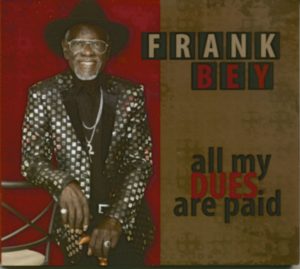 FRANK BEY
FRANK BEY
All My Dues Are Paid
Nola Blue – NB 010
From the opening notes of the swaggering, funky cover of Idle Hands, Philadelphia soul/blues man Frank Bey’s All My Dues Are Paid delivers a signature statement in a career that has had its share of struggles.
The sizzling cover of the Eddie Palmieri and Harlem River Drive’s Latin/fusion/soul gem is a fitting opener for an album of excellently arranged, masterfully performed soul blues. Bey has assembled an all-star cast of players for his sixth solo disc, including first-call blues sidemen Jim Pugh (keyboards), Jerry Jemmott (bass), and Kid Andersen (guitar), with production by Andersen and Rick Estrin, both stepping out from their day jobs in Rick Estrin & the Nightcats.
Bey joined the funk group Moorish Vanguard in the 1970s, but a would-be record deal involving James Brown went off the rails, resulting in a demoralized Bey walking away from music for over 17 years. After returning to the stage in the 1990s and despite a kidney failure diagnosis, Bey has been on a furious quest to make up for lost time.
On All My Dues Are Paid, the versatility of Bey’s rich voice is on full display on 13 tracks that run the gamut from slow-burn ballads to up-tempo funk to unadulterated traditional soul. His voice sits comfortably in the pocket on the swinging, jazzy Calling All Fools, powered by Pugh’s dancing piano, Jemmott’s slinky bass, and a nuanced solo by saxophonist Nancy Wright.
The autobiographical title track—a collaboration between Bey, Andersen, Estrin, and Kathy Murray—has everything a great soul song needs: undeniable funky groove, great horns, and honest lyrics like, “It took every bit of strength I had to crack that Jim Crow door.”
Bey carefully selected the covers here, taking pains to veer from the obvious. The sparse arrangement on the mournful George Jones classic He Stopped Loving Her Today gives it an arresting poignancy, while the Percy Mayfield oddity Ha Ha in the Daytime benefits from Bey’s warm-as-a-summer-afternoon pipes and a tasty baritone guitar solo by Andersen. Another cut from Mayfield’s catalog, the up-tempo romp Never No More comes with a fiery attack.
One Thing Everyday, with its buoyant, Keb’ Mo’ feel, serves as a great example of Bey’s positive life mantra, as he sings, “Make one person smile / forget about their pain.”
Bey teams with backing vocalist Lisa Leuschner Andersen on a great version of Lou Reed’s Perfect Day, while Bey’s unique, gospel-inflected take on the John Lennon classic Imagine is an excellent study in an artist putting his stamp on a well-known cover.
All My Dues Are Paid, with its abundance of deep grooves and welcome, but unlikely, song selections puts all of Bey’s immense vocal talents on display.
—Rod Evans
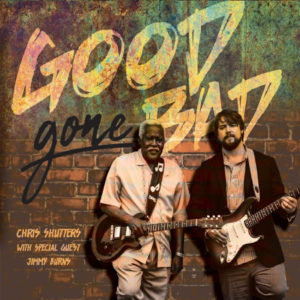 CHRIS SHUTTERS WITH SPECIAL GUEST JIMMY BURNS
CHRIS SHUTTERS WITH SPECIAL GUEST JIMMY BURNS
Good Gone Bad
Third Street Cigar Records – No #
Still in his 30s, Ohio guitarist Chris Shutters has already made a name for himself. After winning a series of blues and singer-songwriter competitions, he released his solo debut, A World Apart, in 2009. In 2013 he recorded and released a follow up, Laugh and Roll the Moon. He’s toured with Ginger Baker’s son Kofi Baker on “The Music of Cream” tours, appearing on Baker’s 2016 album Live in Bremen. Shutters’ latest release, Good Gone Bad, is the culmination of a friendship and musical association that began nearly ten years ago.
Jimmy Burns is a blues and soul guitarist born in Dublin, Mississippi. Younger brother of bluesman Eddie “Guitar” Burns, he established himself as a musician in Chicago. After some minor success in the ’60s, he left music for an extended period, returning in the ’90s with a residency at the Smoke Daddy club in Chicago’s Wicker Park neighborhood. There he came to the attention of Delmark Records’ Bob Koester; to date Burns has released five albums for the label; 2015’s It Ain’t Right is his latest.
Good Gone Bad is a true collaboration in every sense of the word. While much of what passes for collaborative recording today entails flown-in WAV files compiled with no actual face-to-face interaction among the musicians, this album features both musicians singing, playing guitar, and writing material. Seven of the record’s cuts are Shutters originals; three are penned by Burns.
Tried-and-true is a tidy description for many of the songs on this album. Burns’ I-IV-V blues Stop the Train is essentially a laid-back retread of Robert Johnson’s Crossroads Blues with new lyrics and a tasty lead guitar break.
But there’s a playful sense of fun that shines through the tracks. A fine example is Shutters’
Can’t Play the Blues Like B.B., a tune that succeeds precisely by not trying to ape King’s style. The rhythm and blues texture of Burns’ Miss Annie Lou may remind some listeners of Lloyd Price; it underscores that fact that his stylistic scope is wider than the strict blues idiom.
The bouncy lead guitar lick that forms the backbone of Shutters’ Unwind bears a stylistic similarity to both Eric Clapton (in its vocals) and Eric Johnson (in the song’s deft arrangement). A catchy chorus seals the deal, and an instrumental break featuring a saxophone-guitar duel is the icing on the cake.
Like most every blues album that seeks to display a wide range, Good Gone Bad features an acoustic-based, Red House–styled blues. In this case that slot is filled by Poor Boy Blue, a cut written by Shutters but sung by Burns. It’s followed by a blazing Living in a Dream, a supercharged, wah-wah–laden blues that owes debts to Stevie Ray Vaughan, Joe Satriani, and Jimi Hendrix. The track also features the album’s most kinetic bass guitar work.
Jimmy Burns takes an Albert King–flavored lead vocal on Shutters’ Keep You Satisfied. While all ten of the album’s tracks succeed in their own ways, this song is the most effective fusing of the two musicians’ talents.
—Bill Kopp
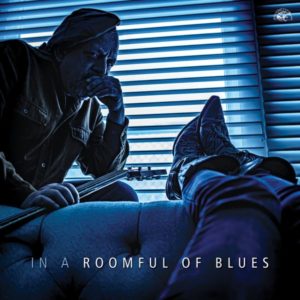 ROOMFUL OF BLUES
ROOMFUL OF BLUES
In a Roomful of Blues
Alligator Records – ALCD-4998
Roomful of Blues is of course the perfect name for this band because they fill up the room with their energetic and propulsive sound. There’s no standing still when these guys are around, for they start out kicking out the jams and take us higher and higher with them on every song. The opening track on their new album—their first in nine years—What Can I Do? swings and sways with pulsing horns and pulsating guitars. It’s a smoking cover of R&B legend Buddy Ace’s original. Roomful of Blues’ cover of Doc Pomus’ Too Much Boogie sashays across the dance floor with its full-bodied swinging rhythms.
The band, led by guitarist Chris Vachon, sax master Rich Lataille, and vocalist Phil Pemberton, delivers a richly textured album filled with a range of blues, jazz, and soul tunes. The funky soul of the title track floats along Vachon’s snaky guitar and the band’s dynamic horn section. Phrases from the Band and the Memphis soul stew from Royal Studios wind through the song. The languid, bluesy ballad She Quit Me Again floats soulfully along a colorful sound tapestry woven from the strains of a jazz lounge piano, vibrant guitars, and undulating horns. She’s Too Much is a jump blues that rockets right off the grooves, while Have You Heard rides along a zydeco rhythm. Raucous and rambunctious, We’d Have a Love Sublime rocks and rolls with a reckless rockabilly flavor. The album closes with the jump blues stylings of I Can’t Wait.
It sure is good to have Roomful of Blues back. There is not a bad song on In a Roomful of Blues, and we’re dancing from the first track to the last. Like the title of the closing song, we can’t wait to hear the next album from Roomful of Blues and hope it’s not as long a time between albums.
—Henry L. Carrigan Jr.
 ANDREW “JR. BOY JONES” AND KERRIE LEPAI JONES
ANDREW “JR. BOY JONES” AND KERRIE LEPAI JONES
Jr. Boy and Kerrie’s Blues
GalexC Records – No #
Guitarist Andrew “Jr. Boy” Jones and singer Kerrie Lepai Jones bring a ton of performing experience to the table on Jr. Boy and Kerrie’s Blues.
The Dallas-based husband/wife duo began performing their brand of comfortable, good-time modern blues nine years ago, while Jr. Boy’s career stretches back to the 1970s when, as a 17 year old, he joined Freddie King’s backing band. After leaving King’s band, he became a member of Dallas singer Bobby Patterson’s band, before hooking up with King again and staying until the blues legend’s death in 1976. He then found work with Johnnie Taylor before joining harp maestro Charlie Musselwhite’s outfit, appearing on three of Musselwhite’s albums in the 1990s before recording the first of his eight solo discs, 1997’s I Need Time for JSP.
Over the past 25 years, Kerrie established a reputation as a go-to singer in the Dallas area, appearing regularly at venerable Dallas night spot R.L. Griffin’s Blues Palace as a solo artist and with her band, the Shifters. She has shared a stage with numerous artists, including Lucky Peterson and former B.B. King band bassist Russell Jackson.
While not a duets album—just three of the 13 original tracks feature both artists—the album showcases their sturdy vocal abilities as well as Jr. Boy’s tasteful, melodic string bending.
The fat grooves of Blues Party, a duet that features husky guitar work and a vibe that feels like walking into your favorite joint after a long day at work, kicks things off. She Shed, sung by Jr. Boy, brings a loping tempo, killer organ by John Street, cascading guitar riffs, and lighthearted lyrics—“I wonder what’s going on out there / I didn’t get a set of keys.”
Kerrie takes over on vocals on the slow-burn, cautionary tale Mr. Slick that benefits from a delicate arrangement and simmering guitar. Blues at Sunset is the best of the CD’s three instrumentals, thanks to its slinky tempo and Street’s inventive piano work on top of a chord structure that resembles the classic Stormy Monday.
Jr. Boy delivers one of his strongest solos on Kerrie’s ballad Do You Ever Think About Me, while the duo join forces on the funky ode to life on the road, Road Doggin’. The duet shuffle of Good Life serves up some heavenly, gospel-like harmonies.
The set features clever arrangements throughout that allow the duo and band—Tim Waites (bass), Tommy “The Thrill” Hill (drums), Debra Bohannon (backing vocals), and Street—to flex their chops, like the crunching soul instrumental, Sunday Drive, and the up-tempo ripper, Don’t Mess With Me.
These blues veterans bring plenty of skill and passion to this debut duo release that shows promise for them to dig even deeper going forward.
—Rod Evans
 ANDREW ALLI
ANDREW ALLI
Hard Workin’ Man
EllerSoul Records – ER 20201
Harmonica man and singer Andrew Alli never picked up a harp until 2008, when he was 21 years old. As evidenced by Hard Workin’ Man, his first album leading a band, Alli has been working really hard because he’s delivered an impressively authentic program of Chicago-style blues that evokes the harmonica legends who defined the genre during the 1950s. Alli, a Richmond, Virginia, native, injects echoes of Little Walter Jacobs, Big Walter Horton, Junior Wells, George “Harmonica” Smith, James Cotton, and Sonny Boy Williamson II into the 12-track program and, at the same time, asserts an individual identity, much the way players like Paul Butterfield and Charlie Musselwhite did in the 1960s.
In addition to the harmonica work and singing, Hard Workin’ Man features a remarkably authentic-sounding band. Guitarist Danny Michel, guitarist/bassist Jon Atkinson, pianist Carl Sonny Leyland, and drummer Buddy Honeycutt bring to mind the hard-driving, no-nonsense grooves created by the Aces—guitarist Louis Myers, bassist David Myers, and drummer Fred Below—behind both Jacobs and Wells. Working together like gears in a well-oiled machine, these musicians eschew flashy blues rock guitar histrionics and keep their eyes on supporting the leader’s vocals and harp solos with seductive riffs, and step up to contribute taut solos that serve the performance of the songs. That vintage Chicago ambiance is also reinforced with the retro feel of the recording; it definitely features a live-in-the-studio sound. And, like the tracks that were being laid down on classic Chicago labels like Chess, Vee-Jay, and Cobra, which were producing records to play on juke boxes and keeping dancers and drinkers rocking, all of these performances are just over two to three minutes long, with the exception of one that clocks in at 4:02.
Alli’s nine original compositions are in line with that traditional blues agenda. Highlights include two instrumentals, the bravura Chron-A-Thick and low-down AA Boogie; the loping groove on Going Down South with its stinging slide guitar fills; and the up-tempo shuffle Easy Going Man. Alli pays homage to his forbears with effective covers of Jacobs’ One More Chance; Smith’s Good Things; and Horton’s Walter’s Sun. Hard Workin’ Man is definitely an album of old-school Chicago blues and a portent of good things to come, as Andrew Alli follows a vocation to keep these blues alive.
—Robert H. Cataliotti
 RORY BLOCK
RORY BLOCK
Prove It on Me
Stony Plain Records – SPCD-1409
Two year ago, Rory Block released A Woman’s Soul: A Tribute to Bessie Smith, the first album in her series devoted to “power women of the blues.” The award-winning Block is the perfect artist to curate this series, for she dwells in traditional acoustic blues and these songs inhabit her. In this second volume in the series, Block pays tribute to nine women and their music: Helen Humes, Madlyn Davis, Rosetta Howard, Gertrude “Ma” Rainey, Arizona Dranes, Lottie Kimbrough, Memphis Minnie, Merline Johnson (Yas Yas Girl), and Elvie Thomas. Block also includes one original on the album, a song titled Eagles, a jaunty straight-ahead song about personal ups and downs, complete with an ethereal chorus.
One of the album’s highlights is Block’s version of Dranes’ I Shall Wear a Crown. Dranes delivered many of her gospel songs in an up-tempo pace; Block evokes such a pace here, and she captures the upward-looking hope of the song with a call-and-response chorus. Block recovers the music and names of blues women whose names have been lost to us. Block gives us a pattering New Orleans jazz version of Rosetta Howard’s take on If You’re a Viper, and she delivers a scampering take on Helen Humes’ He May Be Your Man, whose bass line mimics the singer’s way of walking away with another woman’s man. Block’s shimmering slide guitar provides the sonic texture for her take on Memphis Minnie’s In My Girlish Days, capturing the hope of youth and the loss of innocence. The album closes with Block delivering a sparse and powerfully moving version of Elvie Thomas’ Motherless Child.
Prove It on Me is another masterpiece from Rory Block. She captures the essence of each of these songs, driving us back to find more music by these women whose music we need to hear more often than we do.
—Henry L. Carrigan Jr.
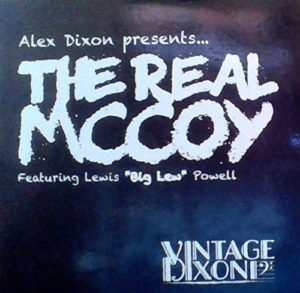 LEWIS “BIG LEW” POWELL
LEWIS “BIG LEW” POWELL
The Real McCoy
Dixon Landing – No #
Big Lew Powell is best known as Latimore’s drummer; when he’s home in Chicago, he holds down the drum chair for Joe Pratt and the Source One Band. This is his debut under his own name, and it’s quite a surprise. Not only does Powell forego his usual seat at the drums to concentrate solely on his vocals; despite his unassailable soul blues cred, he offers up a storming set of straight-ahead Chicago blues, complete with wailing harmonicas (courtesy of Steve Bell and Sugar Blue) and a raucous, guitar-driven band.
There’s a strong Willie Dixon flavor to this disc (offerings include several Dixon standards); that’s not surprising, given that Alex Dixon, Willie’s grandson, produced it; he also plays bass and piano throughout. His daughter, Leila, contributes background vocals on the funk-toughened 10,000 Miles Away, on which Powell’s soul blues vocal chops come closer to the fore. Elsewhere, though, Powell’s deep-chested bellow, the songs’ melodic lines and rhythms (especially the lurching stop-time on Nothing New Under the Sun), and the instrumental voicings sound almost as if they could have been lifted from a long-lost Willie Dixon session.
Despite the obvious influences, this is not an exercise in “revivalist” reverence—instead, it’s a fine example of how music can be deeply rooted, even traditionalist, yet still remain fresh and urgent. Powell’s voice, while not the world’s most supple, is powerful and expressive. The bandsmen, meanwhile, comport themselves superbly. Bell turns in a brilliant evocation of his father, the late Carey Bell (especially on Chi-Town Boogie); Sugar Blue is his usual hard-squalling, irrepressible self; the guitarists (who include such first-call Chicagoans as Rico McFarland and Melvin Taylor) are equally adept at laying down rhythm and firing off clean, expressive leads; drummer Alvino Bennett shuffles and boogies as if to the manor born.
All in all, this is an unexpected and delightful blast of vintage-sounding Chicago blues, channeled and reborn through the imaginations and craftsmanship of younger-generation players whose obvious reverence for the tradition never dulls their fiery commitment to both emotional and artistic immediacy.
—David Whiteis
 SHOJI NAITO
SHOJI NAITO
Westmont to Chicago: Tribute to Eddy Clearwater
Ogden – ORCD 382
He may not be a household name to casual blues fans, but Shoji Naito is an accomplished multi-instrumentalist (harmonica, guitar, and bass) who has firmly established himself on Chicago’s blues scene since moving there from his native Japan in the mid-1990s. He has worked with Billy Branch and Joe Filisko, performed at the Chicago Blues Festival, and his New Cool Old School, released in 2016, received positive reviews from blues critics. No less an authority than Bob Corritore even described him as “an amazing musician who authoritatively knows the delicate nuances of the Chicago blues.”
The most noteworthy entry on Naito’s resume, however, may be his long tenure in Eddy Clearwater’s band from 2004 until the Chief’s passing in 2018. Over the past two years, Naito and other members of the group crafted this collection of 15 tracks in tribute to his legacy and named after the Westmont village that Clearwater called home for a time in the 1980s. (As LB writer David Whiteis recounts in his book Blues Legacy: Tradition and Innovation in Chicago, the Native American headdress that became a staple of Clearwater’s stage persona and in reverence to his grandmother’s Cherokee heritage had its origins with a bartender at the Westmont club the Trieste Lounge, where Clearwater performed regularly during that period.)
Several guests, including Chicago veteran Willie Buck, join Clearwater’s band for this effort, and four previously unreleased tracks from 2015 feature Clearwater, himself. A thoughtfully produced record that will delight fans of the postwar Chicago blues sound, Westmont to Chicago includes covers of Clearwater’s Find Yourself (with vocalist Win Noll), Crossover, and A Minor Cha-Cha; staples such as I Need You So Bad and Reconsider Baby (both featuring Clearwater on vocals and guitar); and a pair of Naito original instrumentals. As a special treat, Naito even offers up a rare acoustic interpretation of James Cotton’s signature barnburner The Creeper (retitled here as Like the Creeper).
—Roger Gatchet










